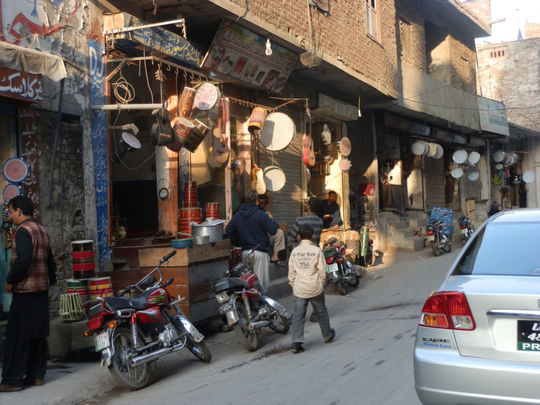
Lahore: Chet Ram Road in the Taxali Gate area of Lahore is home to some of the finest artisans of Pakistan, who make musical instruments. The street is adjacent to Hera Mandi, once a red light area of the city but now turned into a food street. The houses and shops on the street are over 200 years old.
On Chet Ram Road, there are around two dozen shops where musical instruments are made and sold.
Rafaqat Ali, 50, runs family business of making drums — dholak, tabla, banjo and other kinds — including school drums. His family has been making these musical instruments for eight generations.
“My son Ali, who has also learnt the craft, will be the ninth generation,” Rafaqat says.
He takes pride in his profession. “I will earn at the end of the day, whatever the circumstances are. It is because of complete trust in God. I learnt the craftsmanship from my father while I have taught it to my son,” Rafaqat says.
“There are many craftsmen in this market but by the grace of God our shop has great repute. My forefathers were pioneers here. They had migrated from village Troncle of district Wazirabad.
“Many of our [apprentices] who learnt the skills of making musical instruments here moved on to start their own businesses in Amritsar, Peshawar, Karachi and other cities,” the craftsman says.
“I have the distinction of making [reconstructions of] unique tablas in Pakistan’s history, for which I received a lot of appreciation. The media has covered the news of this achievement. I was also invited on PTV program Pas-e-Pardah [Behind the Curtain]. It was a great honour,” he adds.
Over the last decade business has been good. “Gone are the days when we had to rely on occasions. Now we have business around the year,” says Rafaqat, who lives with his family in Karim Park area.
“Christmas is the main occasion in the year when we have huge amount of demand for making drums, tabla and other musical instruments.
“Christians buy a lot of [musical] instruments. They use musical instruments to sing psalms and songs in their prayers. Our drums and tabla are also being played at Lahore Cathedral,” Rafaqat proudly points out.
The Pakhawaj drum is popular among the Hindu community of Pakistan. It is played on important religious festivals and dance rituals.
“Pakhawaj drum sales are quite high when Hindus from Sindh come,” Rafaqat says.
Made according to gender
On average it takes three days to make a pair of tablas. It may come as a surprise to most, but tablas are made keeping in mind male and female genders. The bigger tabla is for bass tunes while the smaller one [female] can be tuned for seven rhythms or notes that traditional music of the land is based on.
A pair of handmade tablas costs Rs3,000 (Dh105; $30). This is the wholesale market rate. In retail shops it can be as high as Rs5,000-Rs6,000.
Ejaz Ali, 39, also runs a small workshop that repairs and makes tabla and drums.
He reminisces about the good old days when customers thronged Chet Ram Street from all corners of the country.
“Now the trend has changed. They give orders on mobile. We send an image of the product on WhatsApp. We get the order and send the product to them. Technology has changed the way of doing business.”
He says cheap imports are making their way onto the street. “The guitars you see here on sale have come from Karachi or China,” Ejaz says.
But he is confident people will always go for quality.
“Our shop is a trusted name and people know that we will never sell them inferior quality product,” he says.












